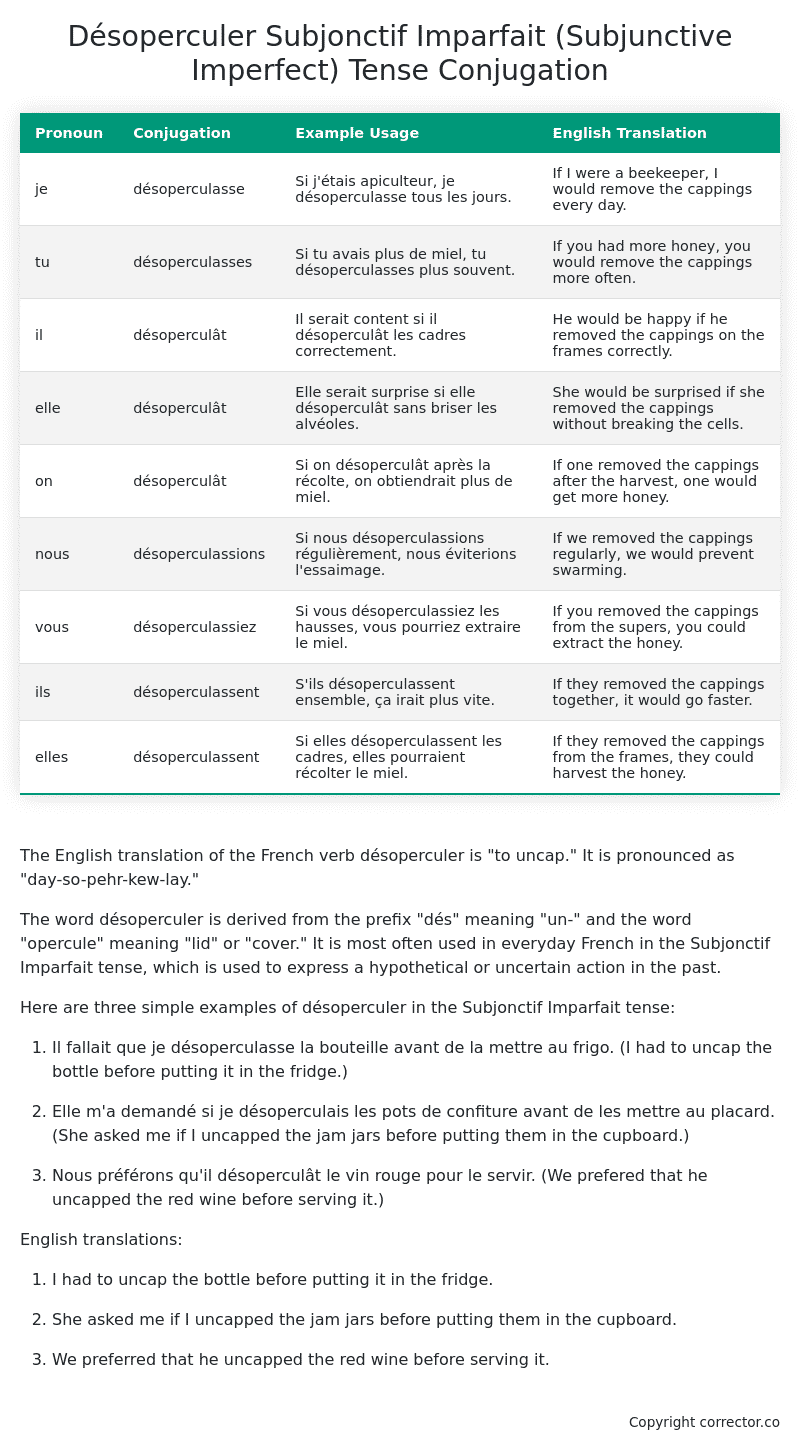Subjonctif Imparfait (Subjunctive Imperfect) Tense Conjugation of the French Verb désoperculer
Introduction to the verb désoperculer
The English translation of the French verb désoperculer is “to uncap.” It is pronounced as “day-so-pehr-kew-lay.”
The word désoperculer is derived from the prefix “dés” meaning “un-” and the word “opercule” meaning “lid” or “cover.” It is most often used in everyday French in the Subjonctif Imparfait tense, which is used to express a hypothetical or uncertain action in the past.
Here are three simple examples of désoperculer in the Subjonctif Imparfait tense:
-
Il fallait que je désoperculasse la bouteille avant de la mettre au frigo. (I had to uncap the bottle before putting it in the fridge.)
-
Elle m’a demandé si je désoperculais les pots de confiture avant de les mettre au placard. (She asked me if I uncapped the jam jars before putting them in the cupboard.)
-
Nous préférons qu’il désoperculât le vin rouge pour le servir. (We prefered that he uncapped the red wine before serving it.)
English translations:
-
I had to uncap the bottle before putting it in the fridge.
-
She asked me if I uncapped the jam jars before putting them in the cupboard.
-
We preferred that he uncapped the red wine before serving it.
Table of the Subjonctif Imparfait (Subjunctive Imperfect) Tense Conjugation of désoperculer
| Pronoun | Conjugation | Example Usage | English Translation |
|---|---|---|---|
| je | désoperculasse | Si j’étais apiculteur, je désoperculasse tous les jours. | If I were a beekeeper, I would remove the cappings every day. |
| tu | désoperculasses | Si tu avais plus de miel, tu désoperculasses plus souvent. | If you had more honey, you would remove the cappings more often. |
| il | désoperculât | Il serait content si il désoperculât les cadres correctement. | He would be happy if he removed the cappings on the frames correctly. |
| elle | désoperculât | Elle serait surprise si elle désoperculât sans briser les alvéoles. | She would be surprised if she removed the cappings without breaking the cells. |
| on | désoperculât | Si on désoperculât après la récolte, on obtiendrait plus de miel. | If one removed the cappings after the harvest, one would get more honey. |
| nous | désoperculassions | Si nous désoperculassions régulièrement, nous éviterions l’essaimage. | If we removed the cappings regularly, we would prevent swarming. |
| vous | désoperculassiez | Si vous désoperculassiez les hausses, vous pourriez extraire le miel. | If you removed the cappings from the supers, you could extract the honey. |
| ils | désoperculassent | S’ils désoperculassent ensemble, ça irait plus vite. | If they removed the cappings together, it would go faster. |
| elles | désoperculassent | Si elles désoperculassent les cadres, elles pourraient récolter le miel. | If they removed the cappings from the frames, they could harvest the honey. |
Other Conjugations for Désoperculer.
Le Present (Present Tense) Conjugation of the French Verb désoperculer
Imparfait (Imperfect) Tense Conjugation of the French Verb désoperculer
Passé Simple (Simple Past) Tense Conjugation of the French Verb désoperculer
Passé Composé (Present Perfect) Tense Conjugation of the French Verb désoperculer
Futur Simple (Simple Future) Tense Conjugation of the French Verb désoperculer
Futur Proche (Near Future) Tense Conjugation of the French Verb désoperculer
Plus-que-parfait (Pluperfect) Tense Conjugation of the French Verb désoperculer
Passé Antérieur (Past Anterior) Tense Conjugation of the French Verb désoperculer
Futur Antérieur (Future Anterior) Tense Conjugation of the French Verb désoperculer
Subjonctif Présent (Subjunctive Present) Tense Conjugation of the French Verb désoperculer
Subjonctif Passé (Subjunctive Past) Tense Conjugation of the French Verb désoperculer
Subjonctif Imparfait (Subjunctive Imperfect) Tense Conjugation of the French Verb désoperculer (this article)
Conditionnel Présent (Conditional Present) Tense Conjugation of the French Verb désoperculer
Conditionnel Passé (Conditional Past) Tense Conjugation of the French Verb désoperculer
L’impératif Présent (Imperative Present) Tense Conjugation of the French Verb désoperculer
L’infinitif Présent (Infinitive Present) Tense Conjugation of the French Verb désoperculer
Struggling with French verbs or the language in general? Why not use our free French Grammar Checker – no registration required!
Get a FREE Download Study Sheet of this Conjugation 🔥
Simply right click the image below, click “save image” and get your free reference for the désoperculer Subjonctif Imparfait tense conjugation!

Désoperculer – About the French Subjonctif Imparfait (Subjunctive Imperfect) Tense
Formation
Common Everyday Usage Patterns
Interactions with Other Tenses
Subjonctif Présent
Indicatif Passé Composé
Conditional
Conditional Perfect
Summary
I hope you enjoyed this article on the verb désoperculer. Still in a learning mood? Check out another TOTALLY random French verb conjugation!


